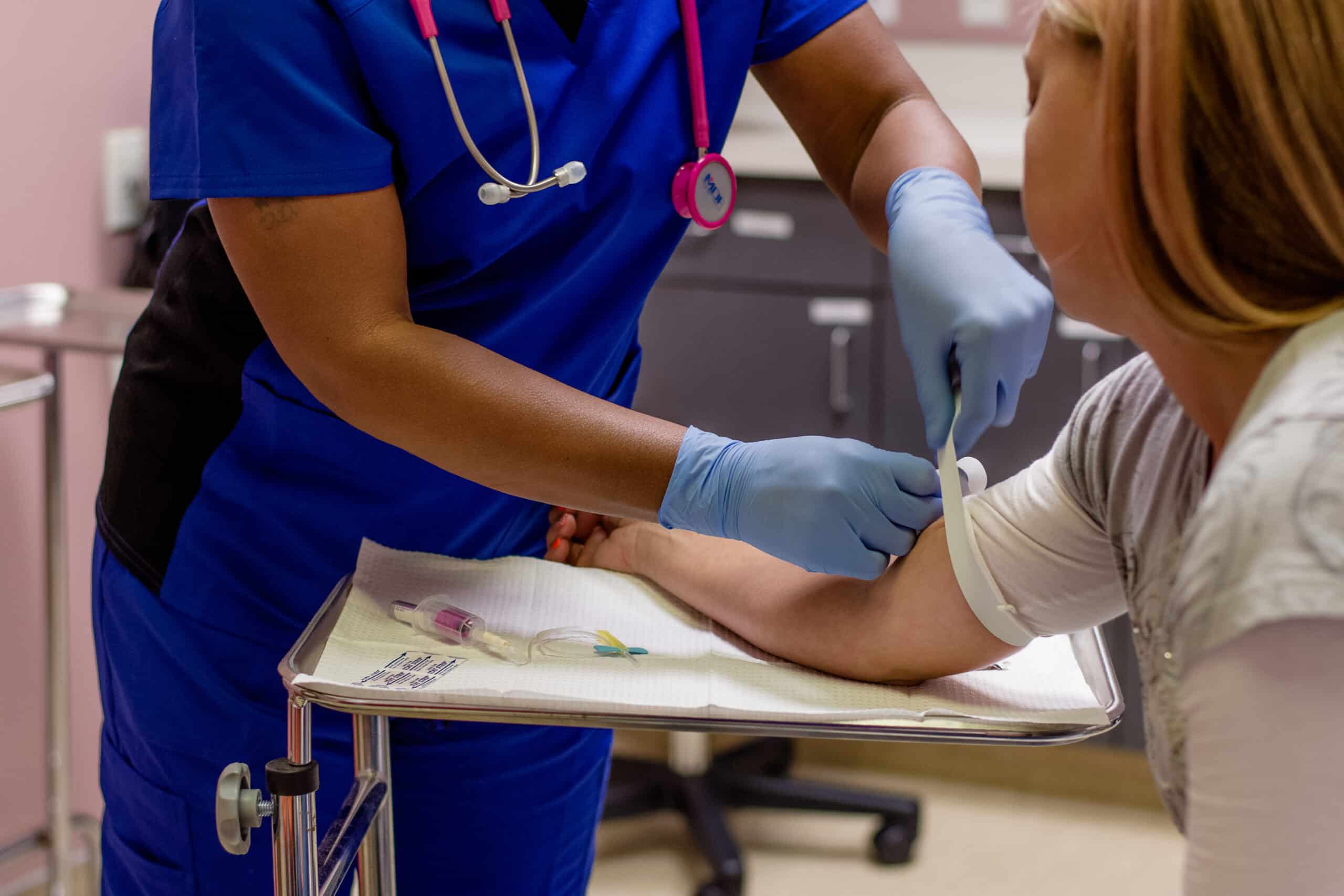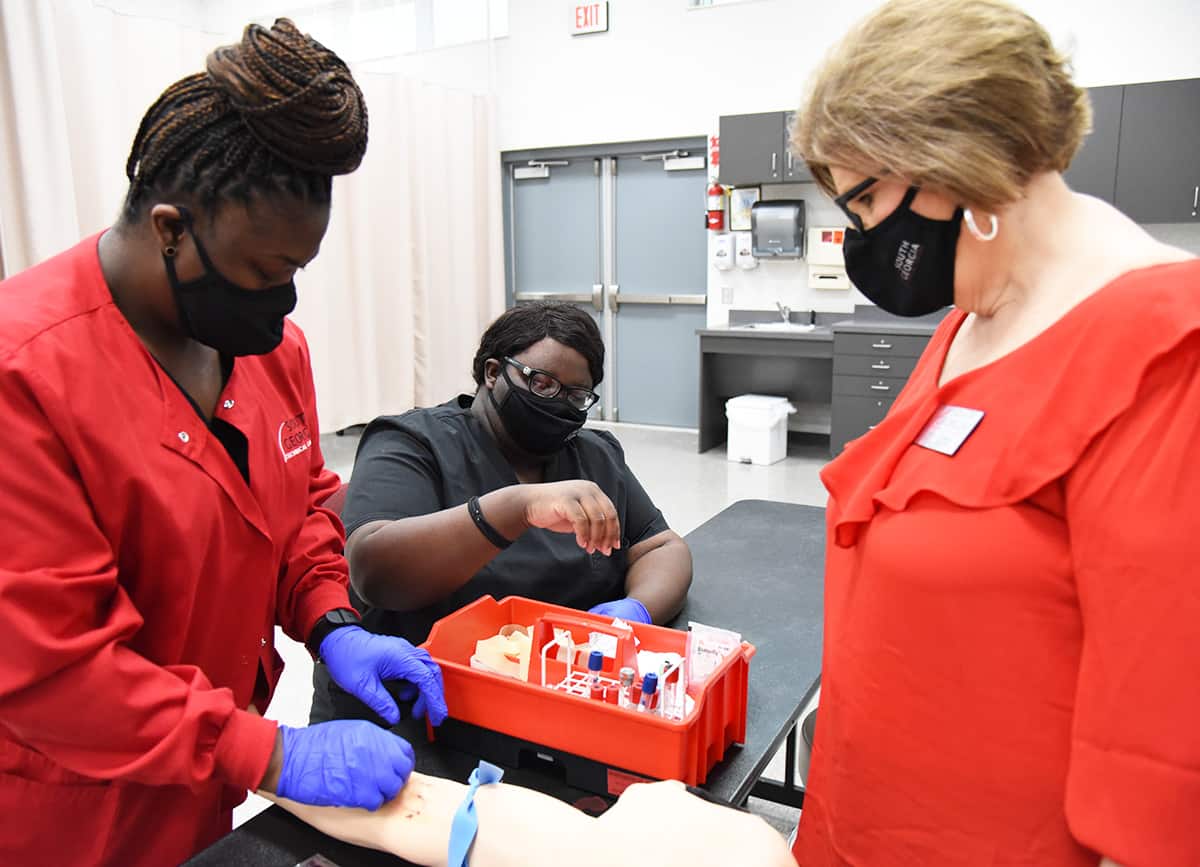Phlebotomy school FAQs: Your Common Questions Answered
Phlebotomy school FAQs: Your Common Questions Answered
Blog Article
The Path to Accreditation: Recognizing the Phlebotomy Training Program Journey and Its Importance
As you consider the path to accreditation in phlebotomy, it's crucial to understand the role you'll play in healthcare. Your training will cover crucial abilities, from blood collection methods to patient interaction. Each part of the program prepares you for the obstacles in advance. What exactly does the trip involve, and why is qualification so essential for your future occupation? Let's explore these questions even more.

The Duty of Phlebotomists in Medical Care
Phlebotomists play a necessary function in the healthcare system, acting as the important web link in between people and vital analysis testing. You'll perform blood draws, ensuring samples are gathered precisely and securely. Your expertise aids in detecting clinical conditions, keeping an eye on health and wellness, and guiding therapy choices.
In your day-to-day interactions, you'll need to develop count on with individuals, making them feel comfortable throughout what could be a difficult experience. You are in charge of classifying and dealing with examples very carefully to avoid contamination or errors, which can influence test outcomes.
Yet, you'll usually function together with doctors and nurses, connecting crucial details about individuals' problems. Your role is basic in keeping the process in medical care settings, making certain prompt and precise results. By mastering your skills, you add meaningfully to person care, making you an important component of the medical team. Accepting this obligation is essential to your success as a phlebotomist.
Introduction of Phlebotomy Training Programs
When discovering phlebotomy training programs, you'll locate different types developed to fit different routines and finding out styles. Each program aids you create crucial skills like blood collection and patient interaction. Understanding these choices is vital to choosing the appropriate course for your career.
Types of Training Programs
Several kinds of training programs are available for those looking to come to be competent in phlebotomy. You can pick from certificate programs, which normally last a few months and concentrate on important abilities. There are additionally diploma programs that provide a more thorough education and learning, usually lasting approximately a year. If you're looking for a much deeper understanding, an associate level in a related field could be the right fit. On-line courses provide adaptability for those stabilizing work or household commitments, permitting you to examine at your own speed. Furthermore, some medical facilities and centers offer on-the-job training programs, offering functional experience while you discover. Whatever course you select, each program intends to furnish you with the necessary abilities for a successful phlebotomy profession.

Secret Skills Created
Mastering phlebotomy requires a set of crucial abilities that are developed with extensive training programs. You'll find out technological abilities like correct blood vessel option, needle insertion, and blood collection strategies. These hands-on methods ensure you can do procedures securely and efficiently. Furthermore, communication abilities are basic; you'll require to engage with clients, explain procedures, and placed them secure. Recognizing makeup and physiology is essential, also, as it assists you situate veins and understand the body's response to blood attracts. Lastly, you'll obtain understanding of security methods and infection control, guaranteeing you keep a sterile atmosphere. Each of these abilities is crucial for your success as a certified phlebotomist, making you an important property in any kind of health care setup.
Trick Parts of a Phlebotomy Program
In a phlebotomy course, you'll concentrate on crucial topics that prepared for your future career. You'll participate in hands-on training that allows you to use what you've discovered in real-world settings. Both the core educational program and useful experience are crucial for your success as a phlebotomist.
Curriculum Review
While pursuing a phlebotomy training course, you'll come across a core educational program designed to furnish you with fundamental skills and knowledge. Phlebotomy school. This educational program usually includes anatomy and physiology, concentrating on the blood circulation system and comprehending blood elements. You'll also discover various sorts of blood collection methods, including venipuncture and capillary slit methods
Additionally, infection control and safety and security procedures are necessary parts, guaranteeing you know how to keep a sterilized setting. You'll study patient interaction, emphasizing communication and compassion, which are crucial for easing client anxiety. Ethical and lawful factors to consider will be addressed, preparing you for real-world duties. This fundamental understanding will certainly enable you to stand out as a phlebotomist and supply high quality treatment in clinical settings.
Hands-On Training Experience
Obtaining hands-on experience is an important component of your phlebotomy training program. This sensible training allows you to use what you have actually discovered in a real-world setting, enhancing your skills and self-confidence. You'll exercise venipuncture techniques, find out just how to take care of different kinds of samplings, and get knowledgeable about the devices made use of in the field. Under the support of seasoned instructors, you'll refine your abilities, guaranteeing you're gotten ready for any kind of situation you might encounter.
Additionally, you'll get the opportunity to engage with patients, which is important for creating your interaction abilities. This combination of technical proficiency and social abilities is essential for your success as a qualified phlebotomist. Eventually, hands-on training is where theory satisfies technique, solidifying your understanding and readiness for certification.
Qualification and Licensing Needs
Before you can begin your job in phlebotomy, it is crucial to comprehend the accreditation and licensing needs that differ by state. Many states require phlebotomists to hold an accreditation from a recognized organization, such as the National Phlebotomy Association or the American Society for Clinical Pathology. These qualifications generally entail passing a test that examines your knowledge and skills in the area.
Along with certification, some states have specific licensing demands. You may require to complete a specific number of hours in professional practice, send evidence of training, or undertake a history check. It is very important to company website research your state's policies to see to it you meet all needed standards.
Remaining educated about these needs not just helps you protect a position yet additionally improves your reliability as a specialist. By satisfying these requirements, you'll be well on your way to an effective profession in phlebotomy.
Hands-On Training and Practical Experience
Hands-on training and practical experience are essential elements of your phlebotomy education, as they allow you to apply theoretical expertise in real-world scenarios. Throughout your training, you'll take part in monitored venipuncture, find out appropriate strategies, and become accustomed to different blood collection devices. This direct participation is crucial for building your self-confidence and developing your abilities.
You'll work carefully with skilled experts that can guide you via the nuances of individual communication and sample handling. Each session not only enhances your understanding yet also prepares you for the fast-paced environment of healthcare setups.
Furthermore, several programs incorporate professional rotations, enabling you to experience diverse setups, from health centers to outpatient facilities. This direct exposure assists you adjust to various obstacles and patient demands, guaranteeing you're well-prepared for your future function. Embrace these possibilities, as they're my link necessary to coming to be a skilled and compassionate phlebotomist.
Difficulties Dealt With Throughout Training
While gaining hands-on experience is crucial, it's crucial to identify the difficulties that can emerge throughout your phlebotomy training. Furthermore, understanding the abilities required for blood attracts takes technique; you might struggle with technique originally.
Time monitoring can additionally be a difficulty, as balancing concept, sensible sessions, and personal commitments can really feel daunting. You may deal with differing learning paces among your peers, bring about feelings of self-doubt if you believe you're dropping behind. Ultimately, adapting to the various individualities of teachers can be tough, as each might have a special teaching style.
Recognizing these obstacles early on can prepare you for success and aid you develop durability throughout your training trip.
Occupation Opportunities After Certification

As you obtain experience, you might also think about specializing in locations like pediatric or senior citizen phlebotomy, satisfying specific patient demands. Some phlebotomists pick to advance their professions by becoming research laboratory technicians or going after further education in medical care fields.
Furthermore, your accreditation can lead to roles in training or overseeing new phlebotomists, allowing you to share your expertise. With the medical care market consistently expanding, your skills will always remain in demand, leading the way for a stable and fulfilling profession. Welcome the possibilities waiting for you!
Regularly Asked Inquiries
What Is the Typical Duration of a Phlebotomy Educating Training Course?
Phlebotomy training courses typically last around four to 8 weeks. You'll involve in hands-on technique, class instruction, and online discovering. Finishing this training prepares you for more accreditation and a rewarding profession in health care.
Are Online Phlebotomy Courses Available?
Yes, online phlebotomy courses are readily available. They offer versatility and benefit, allowing you to examine at your very own pace. Simply validate the program is approved to fulfill certification demands and acquire beneficial abilities for your career.
Just How Much Does Phlebotomy Training Normally Price?
Phlebotomy training usually sets you back in between $700 and $2,500, relying on the program and area. You need to think about elements like training course size, included materials, and hands-on experience when choosing the best training for you.
What Are Typical Requirements for Phlebotomy Training?
Usual requirements for phlebotomy training commonly include a senior high school diploma or GED, immunizations, and a history check. Some programs may additionally need standard health care understanding or accreditations, ensuring you're gotten ready for hands-on training.
Can I Function While Completing My Phlebotomy Training?
Yes, you can work while finishing your phlebotomy training. Numerous pupils balance jobs with their research studies, however make sure to manage your time successfully to ensure you satisfy both job and training commitments successfully.
Report this page